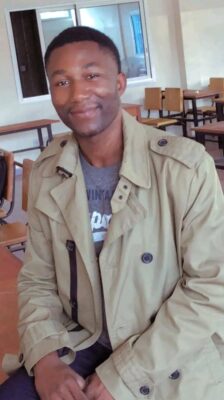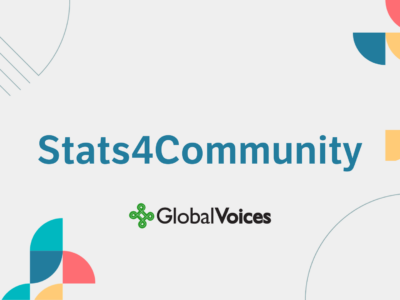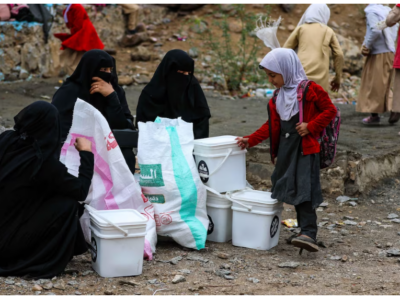
Photo courtesy Daniel Frédéric NGONO. Used with permission.
GV : Tell us more about yourself?
DN : I was born on 18 November 1996 at Mbalmayo, department capital of Nyong and So'o in the Centre Region of Cameroon. After passing my A-levels in Literature and Philosophy at Mbalmayo-Oyack College in 2013, I chose to do a Bachelor's degree in Bilingual Literature (French-English, with a Contrastive Studies module) at the University of Yaoundé I, which I graduated from in 2016. Then, in 2021, I got a Professional Qualification Certificate (PQC) in Editing and Project Management from the CFPAM (Arts et Métiers Professional Training Centre) of Ekounou, Yaoundé. In June 2022, I got accepted in a Master's Degree in Translation, Narration and New Media at the University of Evry — Paris Saclay (France). Unfortunately, I wasn't able to fully grab this opportunity to study abroad as my family's financial situation meant that I couldn't afford to go. As I was passionate and still hoped to fulfil my dream, in October 2022, I finally went to the ISTIC [fr](Higher Institute in Translation, Interpreting and Communication) of Yaoundé. I am currently finishing my MA in Linguistic Engineering and Translation [French-English-LSF (French Sign Language)].
Professionally speaking, in addition to being a computational linguist and professional translator, I am also a writer and an English and French as a foreign language teacher. I have been working at the Collège Catholique Bilingue de la Retraite for over six years. This is one of the most prestigious secondary schools in Cameroon. My latest work, which was awarded the 4th Young Cameroonian Writer Prize (Prix de la Jeune Plume Camerounaise) in 2015 (literary Prize awarded by the Genoo Foundation), is a theatrical piece called Ça sort comme ça sort[fr].
My main interests are languages, literature and culture. I am passionate about translation and its technologies, but also teaching, because I believe that passing on knowledge to posterity falls under the divine.
GV : How did you discover GV and what made you want to join GV?
DN : The first person who told me about Global Voices (GV) was my Editorial Translation teacher at the ISTIC [fr] in Yaoundé. He was telling me what translation skills he found in me and asked me if I wanted to join GV, which he thought, as a volunteer translator, would not only be a great experience for me, but would also be a great way to gain visibility. I thought this was a great idea. Then, he sent me the application link and that's how it all started. At the same time, I was lucky enough to be selected alongside four of my classmates to do an internship with GV. For the director of the ISTIC [fr]— Professor Charles SOH — GV gives a huge opportunity to Professional Translation students to see what professional life is like and to get more familiar with the new technological trends in the translation industry. So, between my teacher's will, my school's will and my own will, I was led into an amazing professional adventure, and it's only the beginning.
The reason I wanted to join GV was because it is one of the biggest volunteer translators communities in the world. We are free to choose between several articles about different topics. Each one of our translations are accessible to millions of people around the world — so we increase our experience and visibility. The other aspect, which is very important, is that GV is at the cutting edge of technology, particularly with its platforms WordPress and Trello. From learning how to use these tools, the choice of the text to translate on Trello and its review on WordPress GV, to the configuration of our user profile, we are automatically getting up to speed with international professional practices in the translation industry – we're a kind of techno-translator!
GV : Why did you mainly translate articles about social sciences and politics?
DN : Well, humans wouldn't be able to understand all aspects of life and the world around them if it wasn't for social sciences. Given the severity of the current issues of the global economy, in a context that is both alarming and holder of new challenges, and faced with the new character of its impact on the functioning of our societies, social sciences are precious. They are the knowledge tool of evolutions and mechanisms that affect our societies. As a professional translator, it is my duty — through the articles I translate — to promote the circulation and transfer of ideas and information from a culture to another, so that, all while breaking linguistic and cultural barriers, everyone in the world has access to the same knowledge and opportunities.
In addition, if you want human rights to be respected, if you want gender equality, democracy to be applied everywhere in the world, migrants and refugees to be respected and protected, corruption and climate changes to diminish… then simply translate anything about politics! Translation doesn't break linguistic and cultural barriers, it raises awareness while giving fair access to ideas and information to everyone, all social classes, all genders. Today, translation goes far beyond the simple rendition of a text from one language to another, from a culture to another, it's a development tool that keeps changing and moves the world forward on all fronts.
GV : What message would you like to convey?
DN : First of all, it's important to say that the translation industry is extremely competitive. You can be an extremely talented translator, but the lack of experience can quickly be an obstacle to professional growth. Translation is an art, and you have to regularly use this art and keep up with its evolution and the new trends in the industry to remain competitive. By translating for GV, I refine my art, I improve and it gives me the possibility to find my place amongst the “masters”.
Moreover, people nowadays are more on the lookout for money than anything else, especially in Africa where life conditions aren't always favourable. Indeed, volunteering isn't very popular. Yet, it becomes evident that, by being a volunteer translator for GV, you accomplish a very noble task: translating so that language is no longer a barrier to understanding global ideas and news. So, we are translators of global utility, and this si why we need to be more known and recognised.



